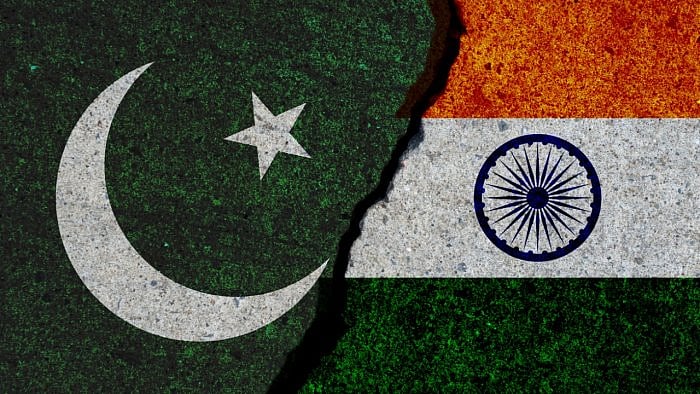
Flags of Pakistan and India
Credit: iStock Photo
New Delhi: India cited Pakistan’s increasing defence expenditure, the outsized role of its military, which is known for its deeply entrenched interference in economic affairs, and the lack of priority on development spending to oppose the Asian Development Bank’s latest financing package of $800 million for the neighbouring country.
The package, approved by the multilateral development bank, headquartered in Manila, despite New Delhi’s objection, included a policy-based loan of $300 million. The other component of the ADB’s $800 million package is the bank’s first-ever policy-based guarantee of up to $500 million, which is expected to help Pakistan mobilise financing of up to $1 billion from commercial banks.
After the International Monetary Fund (IMF), the ADB is the second multilateral development agency to brush aside India’s objections and approve a financing package for Pakistan. Even when the two South Asian nations were engaged in a cross-border military offensive and counter-offensive, the IMF on May 9 overlooked India’s strong objections and allowed the disbursement of $1 billion to Pakistan as the second instalment of its $7 billion loan it had approved in September 2024 to save the country from plunging into a financial crisis.
The ADB approved its $800 million financing package for Pakistan soon after the president of Manila-based multilateral development bank, Masato Kanda, visited India. He met Prime Minister Narendra Modi in New Delhi on Sunday.
The opposition Congress hit out at the BJP-led government of India for not being able to stop the ADB from approving the $800 million financing package to Pakistan, after a similar failure with the IMF earlier this month.
Sources in New Delhi, however, said that India had shared with the ADB its deep concerns over the potential misuse of the multilateral development bank’s resources, particularly in light of Pakistan's increasing defence expenditure, its declining tax-to-GDP ratio, and the lack of demonstrable progress on key macroeconomic reforms.
India also highlighted in its engagements with the ADB that the economic fragility of the borrowing country, Pakistan, posed credit risks to the bank.
Islamabad’s policy of cross-border terrorism against India worsened the security situation in the region and significantly escalated macroeconomic risks for Pakistan, which also heightened the enterprise risks for the ADB, New Delhi conveyed to the bank, according to the sources.
New Delhi conveyed to both the IMF and the ADB that the Pakistan Army’s deeply entrenched interference in economic affairs posed significant risks of policy slippages and reversal of reforms. Even when a civilian government is in power now, the army continues to play an outsized role in domestic politics and extends its tentacles deep into the economy, New Delhi conveyed to the multilateral development banks.
India also cited a 2021 United Nations report that pointed out that military-linked businesses were the “largest conglomerate in Pakistan”. The situation has not changed for the better; rather, the military now plays a leading role in the Special Investment Facilitation Council of Pakistan, India told the IMF and the ADB.
In response to the killing of 26 people, mostly tourists, by a gang of Pakistani and Pakistan-trained terrorists at Baisaran near Pahalgam in J&K on April 22, India on May 7 launched Operation Sindoor targeting the terrorist camps, both in the neighbouring nation as well as in the areas illegally occupied by it.
Pakistan responded by carrying out retaliatory strikes, targeting the civilians living along the Line of Control and the undisputed stretch of the border as well as the military facilities in India. The armed forces of India foiled and effectively responded to all the strikes by Pakistan. The offensives and counter-offensives came to a halt on May 10, after the two sides reached an understanding.
